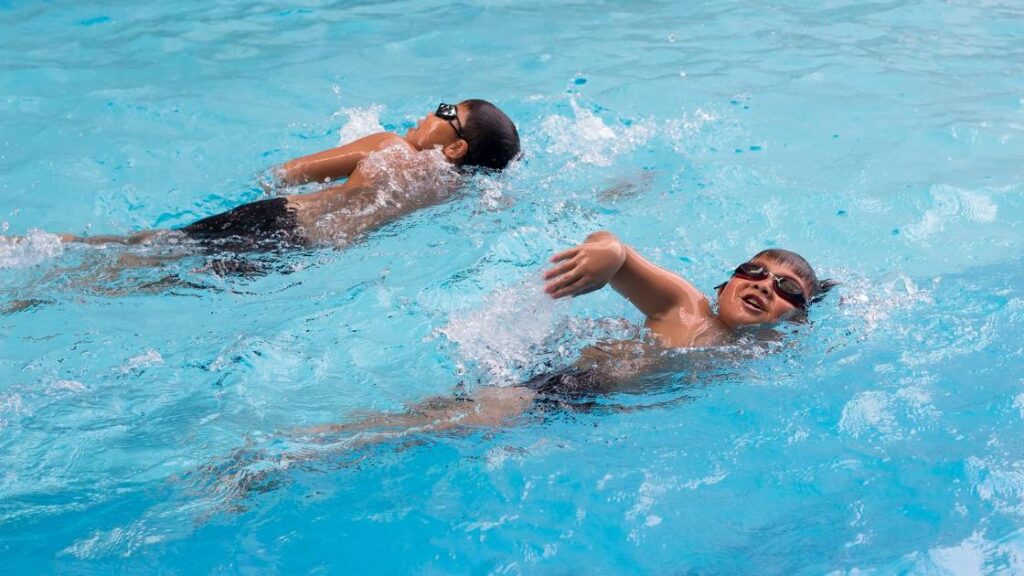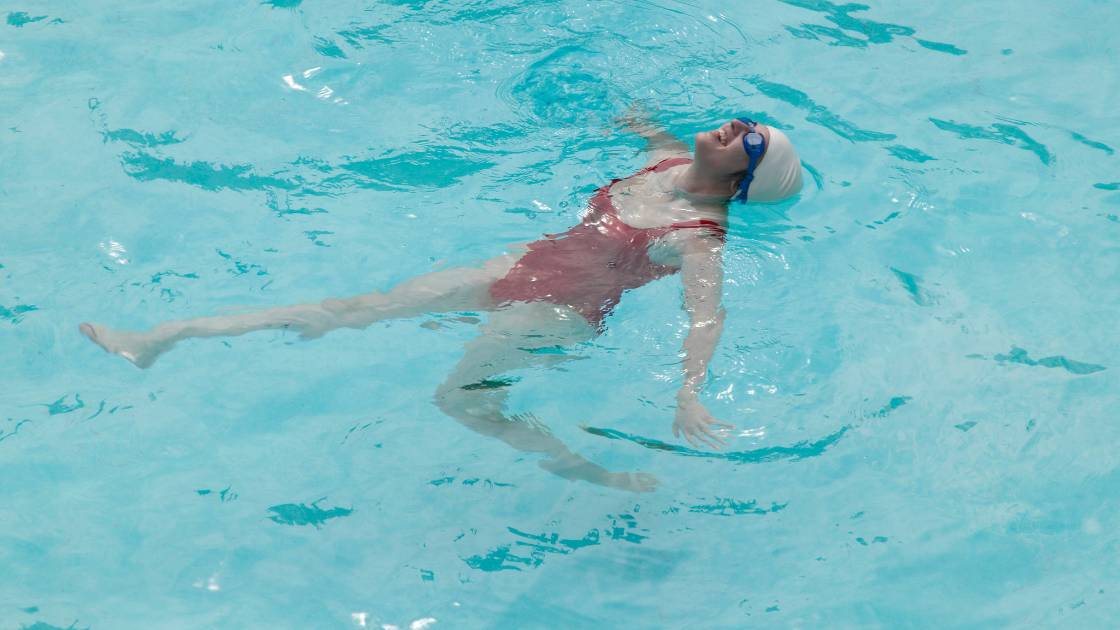One of the most well-liked activities is swimming. But why in particular? If you regularly practice swimming, you can gain a range of advantages. You may have heard that experts recommend that adults perform moderate physical activity for 30 minutes, five days a week, at least.
Swimming is a fun sport that allows you to exercise your entire body while cooling down and improving your cardiovascular system at the same time. This exercise burns almost as many calories in an hour without putting as much stress on your bones and joints as running does.
Learn more about swimming’s advantages and how to include it in your routine.
Top 12 Benefits of Swimming for Health
Swimming is a great way to do a body workout. Try swimming regularly for maintaining your healthy weight. You can have many benefits for physical and mental health from swimming workouts. Here are the major 12 health benefits of this aquatic sport.

Utilizes all of your body
The fact that swimming exercises your entire body from head to toe is one of the sport’s key advantages. You will:
- Increase your heart rate without exerting yourself physically
- Improve your tone muscles
- Increase strength
- Improve your sports endurance
There are different strokes you can employ to add diversity to your swimming routine, including breaststroke, sidestroke, backstroke, freestyle, and butterfly.
Each exercise focuses on a different area of the muscles, and the water offers some resistance. You use the majority of your muscle groups to propel your body through the water, regardless of the swimming stroke you use.
Calories are burned
Burning calories effectively are involved in swimming. A 180-pound person is capable of burning approximately 475 calories each hour while swimming if they can maintain a steady pace.
The same person may swim for an hour and burn up to 715 calories at a quicker pace. For a 200-pound person, the same workouts would result in a calorie burn rate of between 528 and 892. Between 632 and 1,068 calories can be burned by a 240-pound person.

Compared to other popular low-impact sports, walking at 3.5 miles per hour for 60 minutes only burns only 314 calories for the same 160-pound person. Only 183 calories may be burned with yoga in an hour. You can compare all the above figures and draw your conclusions.
Increases your level of energy
People’s lack of energy is frequently caused by inactivity rather than aging. Through an enhanced metabolic rate, just 30 minutes of swimming three times per week can increase your energy levels.
Enhances mental health
Enjoying swimming allows you to relax and produce hormones in the brain that benefit your mind and body. Swimming and water workouts can be physically and mentally beneficial for those with dementia.
Increases Heart Health
Swimming is a great option to enhance your cardiovascular fitness, just like other aerobic exercises. Swimming helps the heart grow stronger and the lungs become more effective at using oxygen. Also, swimming has been connected to improvements in blood pressure, hypertension, and other cardiovascular health markers.

It has a lower impact
Running or extremely difficult cardio workouts might aggravate already-aching joints, but switching out a few sessions for several laps in the pool could be extremely beneficial.
As all people are naturally buoyant in water, you may move around with up to 90% less body weight, which lessens the strain on your bones, muscles, and joints by the same percentage, which is enormous.
It will keep you happy
Any form of activity may improve your mood. But, regular swimming helps lessen stress, soothe anxiety, and fight depression. This is because swimming releases endorphins, dopamine, and serotonin, which are happy chemicals that are released in the brain and will improve mood.
Improve sleep quality
You may be able to get better sleep at night by swimming. In a study on older persons with insomnia, participants who regularly engaged in aerobic exercise reported improvements in both their quality of life and sleep. This is great news because there are a lot of older people who suffer from sleeplessness.
Many people who struggle with physical limitations can benefit from swimming. Swimming may therefore be a great option for senior citizens who want to sleep more soundly.
Suitable for those who suffer from injuries, arthritis, and other issues
Your healing from an injury may go more quickly if you swim, and it may also make you feel better all around. In one study, it was discovered that people with osteoarthritis who engaged in sports like cycling and swimming experienced much less joint pain and stiffness as well as fewer physical restrictions.
The lack of significant differences in the benefits between the two groups is even more intriguing. It seems that swimming has many of the same benefits that are associated with the most popular land exercises.
A wonderful choice for children
Children must engage in aerobic activity for at least 40 minutes per day. Swimming is enjoyable and doesn’t always feel like a structured workout. The kids have the option of taking formal swimming instruction or joining a swim team.
Another great way to get youngsters active is through unstructured swim time.

Suitable choice for asthmatics
Because of the humidity in the air, swimming in indoor pools is a great sport for those with asthma. Furthermore, participating in breathing exercises related to the sport, such as holding your breath, may help you develop better lung capacity and respiratory control.
Alleviates stress
Exercise is known to improve mood, but swimming also has the chemical ability to lessen the impacts of stress.
When you exercise, your body naturally lowers the stress hormones cortisol and adrenaline while also producing the natural mood enhancers’ endorphins. Schedule some time to move, whether it be in the pool or another way, is a good option to avoid a stressful environment.
How to start swimming?
You must first find a pool nearby to start swimming. At gyms and community facilities, lap swimming sessions, water aerobics lessons, and aqua-jogging clinics are commonly provided.
Make a list of the places in your community that have swimming pools, then visit each one to see which one best meets your requirements and price range.
Prepare your body
Go slowly. Before entering the water, it would be best to do a bodybuilding exercise routine to prepare your body. You can start doing assisted or unassisted pull-ups, try up to ten repetitions.
Exercises that are also useful include deadlifts, overhead presses at 50% body weight, and squats. Consider asking a personal trainer for guidance if you’re having issues. It is best to prepare the body a little to avoid injuries.
Plan to take swimming lessons
Those who have never been in the water before might find it advantageous to take swimming lessons, which can be taken in either a private or group environment. Throughout the sessions, you will learn different strokes, breathing methods, and other helpful tips to help you get the most out of your workout.
Learn the theory about swimming
Once you’re in the water, remember to abide by the pool’s rules. There are frequently fast, medium, and slow lanes. Ask the lifeguard which lane to stay in so that you can choose your perfect pace.
Try to avoid any actions when entering and exiting the pool that can produce waves or otherwise block other swimmers, like jumping. To prevent any discomfort in the pool, it is best to learn a little about the rules of swimming.
Is there any risk when swimming?
Almost everyone can swim safely. Like other forms of exercise, swimming has inherent dangers. If you have any ailment or discomfort it is important to first consult your doctor.
It will always be better to consult with your trusted doctor so that he can approve any exercise you want to start practicing. People who have skin conditions like psoriasis may become worse as a result of the chlorinated pool water.
Your doctor is the best person to ask for guidance on specific health issues.
More facts about swimming and its benefits:
- Swimming could cause some pain in the body if you are not used to it. To get reduced pain after swimming and cycling, you just have to warm up your body very well before entering the water. A warm-up of 5 to 10 minutes is more than enough.
- Enrolling in a swimming program is the best way to practice efficient swimming training. In this way, we can obtain all the benefits and effects of swimming.
- If you’re swimming frequently, is because you know that this exercise improves your breathing, self-esteem, body, and mind.
- Swimming is one of the most complete sports that exists since it involves practically all the muscles of the body. In addition, it is one of the sports where more calories are burned.
- Swimming exercise offers many physical and mental health benefits. So practicing it frequently is practically a free medicine. We only need a swimming pool, a bathing suit, and sunscreen.
- Practicing exercises in water provides multiple benefits to people who are overweight. In the water, they can move more easily.
- For a swimming workout routine to work, you must follow at least a 20-week swimming program.
- Exercising in water not only allows you to lose weight but also releases muscle tension and de-stress.
- Swimming can offer a way to have fun while exercising all the muscle groups of the body.
Enjoy swimming
You already know what are the benefits of swimming, so jump in the pool if you’re just beginning a fitness regimen or if you want to try something new. Swimming has several advantages for the mind, body, and soul.
Once you know the basics of swimming, it is recommended that you swim for at least 30 minutes at a pace where you can maintain a high heart rate. Remember to constantly hydrate and rest as your body asks you to.






